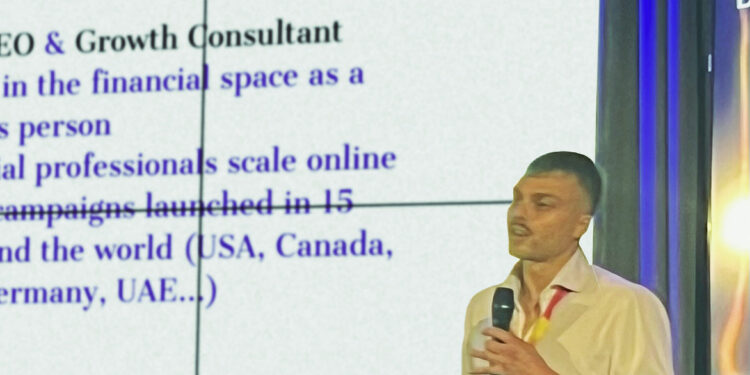When I connected with Leonard Mikulič, founder of LeadGenConsulting.io, I expected a conversation about marketing tactics. What I got was something much deeper: a clear-eyed breakdown of the structural problems holding UK financial professionals back in the digital age—and a blueprint for how to fix them.
Leonard has worked with over 160 financial advisors, insurance brokers, and planners across 15 different countries in Europe, the Middle East, North America, and Oceania. His company builds done-for-you acquisition systems that help advisors generate leads ethically and predictably—without cold calling, spamming, or becoming a full-time content creator.
Below is our conversation, edited for clarity and flow.
What’s the biggest mistake UK financial professionals are making right now in their digital growth?
Honestly, it’s treating digital growth like a side project. Most advisors know they need an online presence—but they’re still dabbling. A few LinkedIn posts. Maybe a Google ad. But there’s no system. No structure.
Meanwhile, younger clients are doing their research online. They make decisions fast. If you don’t show up clearly, with relevance and trust signals, you’re just invisible.
What do you mean by “system”? How does that differ from, say, content marketing?
A lot of advisors think digital growth means becoming a content creator. That’s exhausting—and unnecessary.
What they need is a system that works in the background – a niche positioning that immediately signals who they help and why, a lead magnet that pulls in qualified interest, automated follow-ups that nurture trust over time, and a booking process that removes friction.
That’s what we build. It’s not about going viral—it’s about filling calendars with ideal-fit clients.
You’ve worked with professionals across many countries. What’s unique about the UK market?
Advisors in the UK are extremely knowledgeable. Many are chartered, regulated, and experienced. But that same professionalism can sometimes create hesitation. There’s a fear of appearing “salesy” or using automation the wrong way.
Unfortunately, that fear often leads to feeling stuck. So they fall back on referrals and word-of-mouth—and ignore the scalable systems that others are using to grow faster.
What are some outdated methods you see advisors still relying on?
Seminars, brochures, and local networking still have a place—but they’re not enough anymore.
Millennials and Gen Z expect speed, clarity, and proof of value—digitally. They don’t want to sit through a 90-minute PowerPoint in a hotel conference room. They want to see your expertise in action before they ever book a call.
That’s why your online positioning matters so much. “Helping HNWI achieve financial peace of mind” won’t cut it. It needs to be specific: “Helping tech founders with multi-six-figure exits protect their cash flow,” for example. That’s what grabs attention.
And when financial professionals do decide to outsource their growth, what should they watch out for?
This is a big one. Many hire generalist marketing agencies that have no idea how financial services work. They treat financial pros like e-commerce brands. They run flashy ads, ignore compliance, and chase metrics that don’t matter.
Financial service is a high-trust, high-ticket relationship. You need someone who understands the psychology, regulation, and nuance of the industry. That’s why we chose to go all-in on this niche. We don’t try to be everything to everyone.
You mentioned automation earlier; some professionals view that as impersonal or even risky. What’s your take?
I hear that a lot. But ethical automation is one of the most powerful tools a financial professional can use, especially if they’re busy.
It doesn’t mean spamming people. It means staying top of mind. Following up when you’re in meetings. Sending resources that educate. Showing you care, consistently, without having to manually remember every touchpoint.
Done right, automation makes your practice feel more human, not less.
For financial professionals who are just starting to rethink their digital strategy—where should they begin?
Start with your niche. Ask: Who do I really want to serve? What are their specific pains, fears, and goals?
Then audit your entire online presence through that lens. Does your headline speak to them? Does your content address their needs? Is there a clear next step?
And if it feels overwhelming, don’t try to piece it all together alone. That’s what firms like ours are built for. We don’t coach, we build and manage the whole system for you, from content to outreach to conversion.
Last question: What does the future of financial advice look like to you?
It’s personalized. It’s digital-first. And it’s built on visibility and trust. Financial professionals who embrace that, who invest in positioning, build real systems, and speak directly to the people they want to serve, they’re going to win.
The rest? They risk becoming invisible. Not because they’re not good advisors—but because they’re not showing up in the right way, at the right time.
To learn more about Leonard Mikulič and LeadGenConsulting.io, visit leadgenconsulting.io or follow Leonard on Instagram at @leonardmikulic.





























